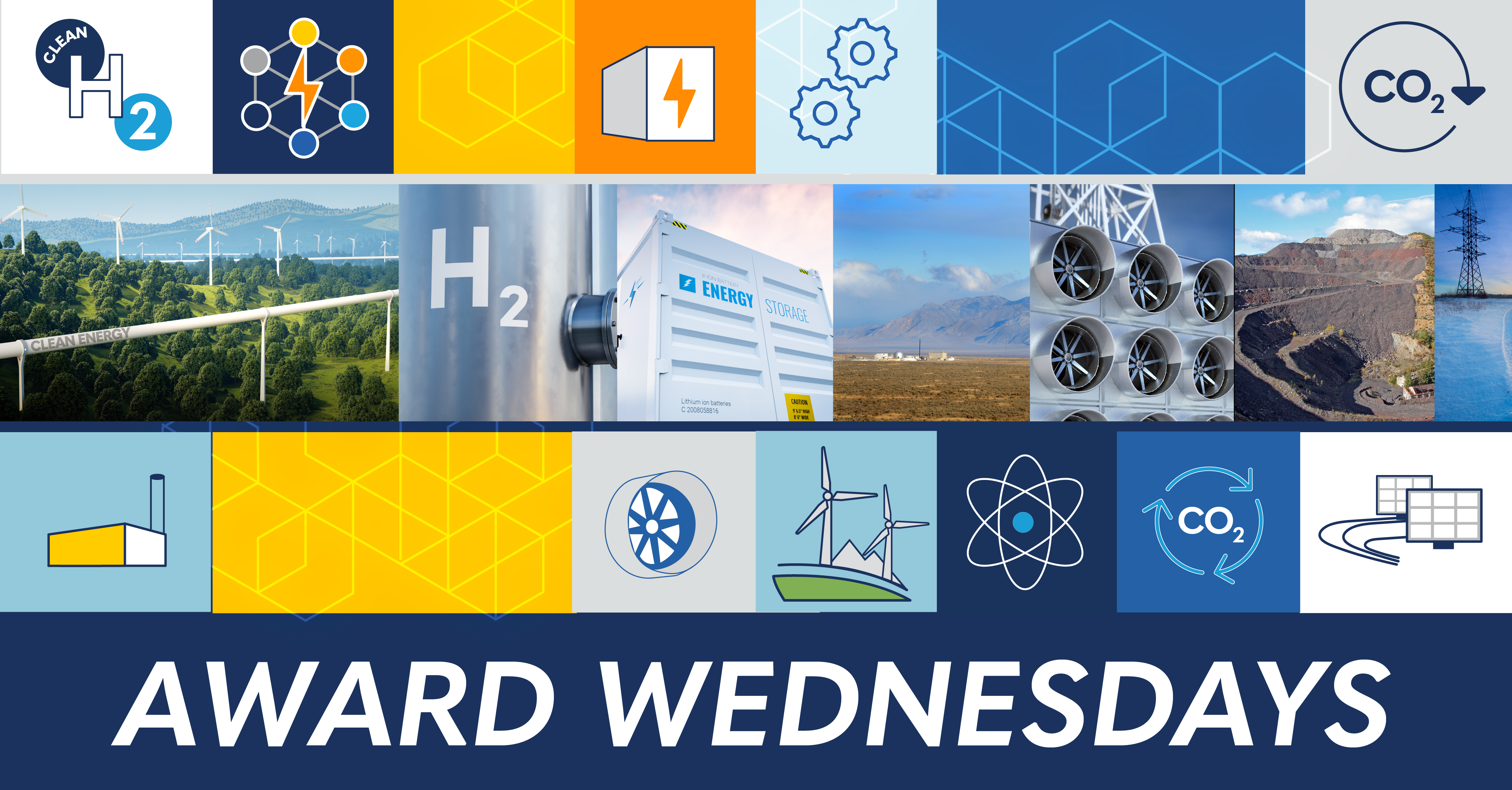This week's awards: ERA's Montezuma Microgrid; IDP's Delicious Decarbonization Through Integrated Technologies: Electrification, Renewables, and Energy Storage, Lebec Net Zero Cement Plant Project, and “Right Way” Next Generation Melt Project
Office of Clean Energy Demonstrations
December 4, 2024
On Wednesdays, OCED will announce the latest projects that have successfully completed award negotiations. OCED will only issue an Award Wednesday notification on weeks when an award has been finalized.
Energy Improvements in Rural or Remote Areas
Montezuma Microgrid
OCED awarded the Montezuma Microgrid project, led by Iowa State University (ISU) Electric Power Research Center, with more than $500,000 dollars (of the total project federal cost share of up to $9.5 million) to begin Phase 1 activities. The project plans to implement the first utility-scale microgrid in the state, providing energy resilience and reliability and reducing greenhouse gas emissions. The proposed project strives to deploy a 2.5 MW solar photovoltaic (solar PV) array and 1.5 MWh battery energy storage system (BESS) microgrid with electric vehicle chargers and advanced metering to reduce reliance on aging infrastructure and back-up diesel generation. During Phase 1, ISU will conduct planning and development activities, including securing agreements, preparing materials for the National Environmental Policy Act review, and initiating community and labor engagement.
View the project fact sheet and community benefits commitments summary here. Learn more about engagement opportunities here.
Industrial Demonstrations Program
Delicious Decarbonization Through Integrated Technologies: Electrification, Renewables, and Energy Storage
OCED awarded the Delicious Decarbonization Through Integrated Technologies: Electrification, Renewables, and Energy Storage project, led by Kraft Heinz Foods Company, with more than $5.9 million (out of the total project federal cost share of up to $170.9 million) to begin Phase 1 activities. The project plans to upgrade and decarbonize its process heat using sustainable technologies at up to 11 facilities by applying a range of technologies such as heat pumps, electric heaters, and electric boilers in combination with energy efficient and renewable technologies. The tailored application of these technologies is expected to reduce annual emissions by more than a combined 100,000 metric tons of carbon dioxide per year if implemented at the 11 sites. By demonstrating the integration of multiple decarbonization pathways, this project seeks to help a major American brand achieve deep decarbonization and serve as an example for other U.S. food and beverage companies to reduce emissions from process heat while reducing energy costs.
During Phase 1 of the program, Kraft Heinz Foods Company will conduct Front-End Engineering & Design (FEED) and Optimization activities, provide documentation and reports necessary to complete the National Environmental Policy Act (NEPA) review, and engage community and labor stakeholders.
View the project fact sheet and community benefits commitments summary here. Learn more about engagement opportunities here.
Lebec Net Zero Cement Plant Project
OCED awarded the Lebec Net Zero Project, led by the National Cement Company of California Inc. (NCC-CA), withmore than $7.8 million (of the total project federal cost share of up to $500 million) to begin Phase 1 activities. The National Cement Company of California plans to produce carbon-neutral cement at the Lebec, CA cement plant. The project plans to deploy three strategies: using locally sourced biomass from agricultural byproducts such as pistachio shells to replace a portion of the plant’s fossil fuel reliance; producing limestone calcined clay cement (LC3) using a less carbon intensive alternative (calcined clay); and capturing and sequestering the plant’s remaining carbon dioxide emissions, estimated at 950,000 metric tons each year. This project aims to demonstrate how a combination of decarbonization levers can drive emissions associated with existing U.S. cement production facilities to net-zero.
During Phase 1 of the project, NCC-CA will complete initial conceptual and engineering studies for the project, provide documentation and reports necessary to complete the National Environmental Policy Act (NEPA) review, and engage community and labor stakeholders.
View the project fact sheet and community benefits commitments summary here. Learn more about engagement opportunities here.
“Right Way” Next Generation Melt Project
OCED awarded the “Right Way” Next Generation Melt Project led by American Cast Iron Pipe Company, with more than $4.2 million (of the total project federal cost share of up to $75 million) to begin Phase 1 activities. American Cast Iron Pipe Company aims to electrify its process by replacing a cupola furnace with four induction furnaces, eliminating coke (derived from coal) combustion, and reducing melt process carbon dioxide emissions by an estimated 95% at its Birmingham, AL, facility. These upgrades can be replicated throughout the ductile iron pipe industry to provide lower-carbon footprint piping for municipal water systems to replace America’s aging water infrastructure, and support new industries, including chip and battery manufacturing plants. This project would also contribute to reductions in criteria and other relevant air pollutants.
During Phase 1 of the project, American Cast Iron Pipe Company will complete the specifications for the new furnace, major equipment, and layout, provide documentation and reports necessary for OCED to complete the National Environmental Policy Act (NEPA) review, and carry out preliminary meetings with workforce and community groups in the area.
View the project fact sheet and community benefits commitments summary here. Learn more about engagement opportunities here.



